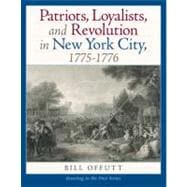
Note: Supplemental materials are not guaranteed with Rental or Used book purchases.
Purchase Benefits
What is included with this book?
Bill Offutt has been Director of the Pforzheimer Honors College (2001-07) and is currently the Honors Faculty Advisor and Associate Professor of History at Pace University. His book, Of Good Laws and Good Men: Law and Society in the Delaware Valley 1680-1710, was published in 1995. His academic interests focus on the relationship between law and society, particularly the methods by which legal systems obtain and keep their legitimacy. He has taught classes in colonial America, revolutionary America, the Civil War, Constitutional history, and American women’s history. The American Revolution game is paired with the “Anne Hutchinson” game to form a Reacting course under an existing course for freshmen at Pace entitled “The Early American Legacy.”
Contents
I. The Game
Introduction
Prologue: New York City, February 9, 1775
Map of New York City, 1730—70
A Walk through the City
The Historical Context
The Crisis in Great Britain’s North American Colonies, 1763—1775
Social Roots of the Revolutionary Crisis
Economic Roots of the Revolutionary Crisis
Political Roots of the Revolutionary Crisis
The (Debatable) Logic of Colonial Resistance
Key Elements of the Game
Game Situation at Start
The Cast of Characters
Role Distribution by Class Size
Class Assignments and Activities
Overview
Week One (and a Half): Setting Up
Week Two (Game Sessions 1—2): Expected Issues
Week Three (Game Sessions 3—4): Expected Issues
Week Four (Game Sessions 5—6): Expected Issues
Rules for Playing the Game
Provincial Congress Procedures
Oral Presentations
Secrecy Concerning Your Role
Private/Personal Deals
Mob Action
Assignments and Grading
Written Assignments
Grades
Game Performance points [If used–consult Gamemaster]
II. Appendices
Appendix A. Chronology of Events preceding the American Revolution
Appendix B. John Locke, Second Treatise of Government
Introduction to Locke’s Second Treatise
The Second Treatise of Government (Excerpts)
Appendix C. Documents
Two Pamphlets on the Stamp Act Debate (1765)
Samuel Johnson, pamphlet, “Taxation no Tyranny” (1775)
Samuel Seabury, Letters of a Westchester Farmer: The New York Loyalist Position (1774—75)
Thomas Paine, Common Sense (Excerpts, 1776)
James Chalmers, Plain Truth (The Loyalist Response to Common Sense, 1776)
Appendix D. Bibliographical References
The New copy of this book will include any supplemental materials advertised. Please check the title of the book to determine if it should include any access cards, study guides, lab manuals, CDs, etc.
The Used, Rental and eBook copies of this book are not guaranteed to include any supplemental materials. Typically, only the book itself is included. This is true even if the title states it includes any access cards, study guides, lab manuals, CDs, etc.